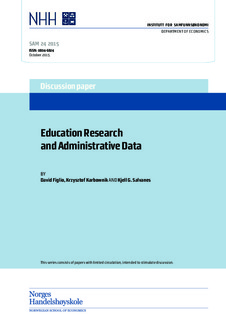| dc.description.abstract | Thanks to extraordinary and exponential improvements in data storage and computing
capacities, it is now possible to collect, manage, and analyze data in magnitudes and in
manners that would have been inconceivable just a short time ago. As the world has
developed this remarkable capacity to store and analyze data, so have the world’s
governments developed large-scale, comprehensive data files on tax programs, workforce
information, benefit programs, health, and education. While these data are collected for
purely administrative purposes, they represent remarkable new opportunities for expanding
our knowledge. This chapter describes some of the benefits and challenges associated with
the use of administrative data in education research. We also offer specific case studies of
data that have been developed in both the Nordic countries and the United States, and offer
an (incomplete) inventory of data sets used by social scientists to study education questions
on every inhabited continent on earth. | nb_NO |
